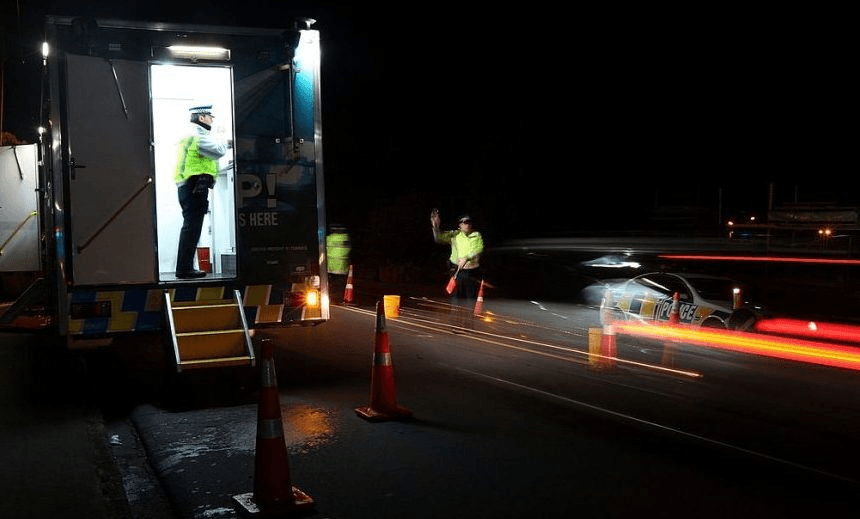Targeting people who attended a euthanasia advocacy group meeting under the guise of a road safety operation is deeply disturbing. The police minister needs to condemn it immediately, writes Toby Manhire
Breath-testing checkpoints have these days become a staple of the New Zealand driving experience, as reliably familiar and cheering/infuriating as flocks of sheep being herded down a highway or slow drivers accelerating into passing lanes.
But public support for the checkpoints, much like public confidence in the police at large, hinges on their purpose: to curb drink driving, via enforcement and disincentive. It assumes that they would not, say, mount such an operation with an ulterior motive.
But in a startling admission today, police have admitted to Stuff reporter Tom Hunt that they did just that. What looked like a routine breath-testing checkpoint earlier this month was undertaken on false pretences – the real goal was to collect information about people, elderly women indeed, who had just attended a meeting held by the Exit International euthanasia group.
The checkpoint operation – which appears to be part of a wider crackdown – is already the subject of a complaint to the Independent Police Conduct Authority.
In a statement provided to Stuff, Inspector Chris Bensemann confirmed the checkpoint was to “identify people attending an Exit International meeting in Lower Hutt”.
He is also quoted as saying:
“Police are responsible for enforcing New Zealand’s laws, and currently suicide or encouraging/helping someone to commit suicide – is illegal in New Zealand.”
Suicide is not illegal in New Zealand. It just isn’t. Assisting someone else to commit suicide is of course another matter.
And he said this:
“Information gathered through the checkpoint has enabled police to provide support and information, to those people who we had reason to believe may be contemplating suicide.”
Wait, what? How? It was a humanitarian mission? If that is the purpose the police should presumably set up checkpoints outside schools, given the appalling, painfully high teen suicide rate.
Did they pass this information on to other agencies or organisations that support people who have contemplated suicide? Or did they bowl up on their doorsteps with the classic sensitivity and understanding for which constabularies are famed? No prizes for guessing.
The earlier Stuff article reported the “support and information”, as provided to one of 10 reported women who were contacted, saw “two plain-clothes police officers knock on [the group member’s] door asking about her association with Exit.”
She went on to explain: “I attended the meetings to show solidarity, but had no interest in committing suicide at present. The policeman doing most of the talking then asked, ‘So you don’t have a bottle of Nembutal hidden away?’, to which I replied, ‘No’. We then passed on to talk of other things. During the brief discussion … they said they were investigating the activities of the leader of the group. They did not explain further what they meant by this.”
The police do not write the law, and they can reasonably say they are simply investigating what they suspect to be illegal behaviour. But Exit International is an advocacy group: for the police targeting them under the guise of a road safety operation has, at worse, a Stasi-esque stench about it; at best it appears corner-cutting.
If the police have sufficient cause to create a roadblock to question to people, why don’t they do just that? Why cook up a spurious breath-test checkpoint? Is it because there’s less hassle, fewer hoops to go through, to set one up? Is it because they thought it would create less of a stir? (If so, that went well.) Deception should surely be one of the last resorts. It can only lends credence to the suggestion by ACT leader David Seymour that the wider operation may be “politically motivated”.
Notwithstanding questions around police priorities, to mount a breath-test checkpoint under false pretences and then to doorstep people who are more likely than most to be vulnerable looks not just ill-judged but cavalier. If not illegal: the lawfulness of the operation has been called into question by lawyers: if any convictions or fines were secured as part of that Hutt operation, they may face legal challenges.
The police minister, Judith Collins, should come down hard on this – demand that the Police lay out when and how often they have employed such tactics before, and insist that it must not happen again.





